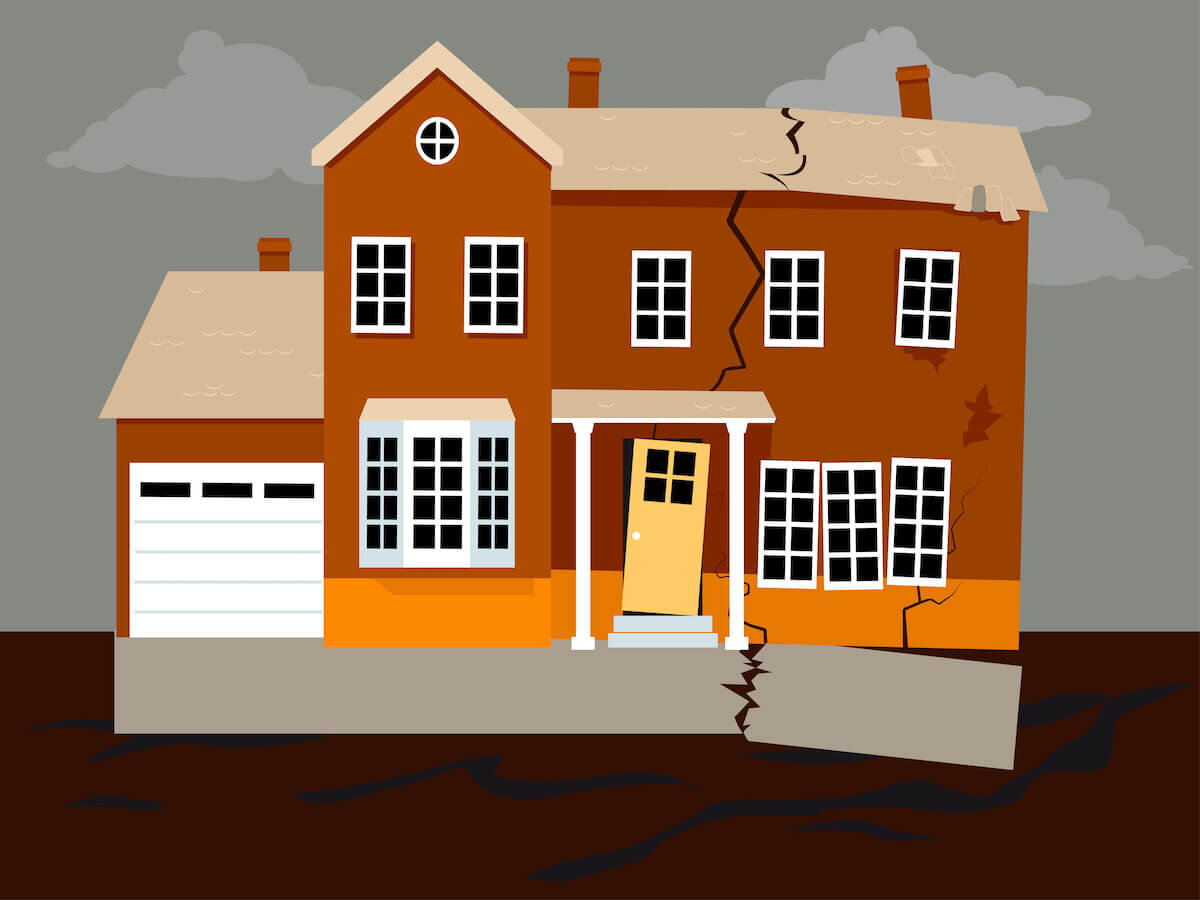 When selling a house with foundation issues, it’s best to confront the problem head-on. Although structural problems might initially deter some buyers, they can open the door for those specializing in renovations or looking for a potentially lucrative project. Setting a competitive price that accounts for the cost of repairs is crucial, and homeowners should be prepared to negotiate accordingly. There’s a strategic approach to selling a home with foundation issues that can turn apparent weaknesses into compelling selling points.
When selling a house with foundation issues, it’s best to confront the problem head-on. Although structural problems might initially deter some buyers, they can open the door for those specializing in renovations or looking for a potentially lucrative project. Setting a competitive price that accounts for the cost of repairs is crucial, and homeowners should be prepared to negotiate accordingly. There’s a strategic approach to selling a home with foundation issues that can turn apparent weaknesses into compelling selling points.
For informational purposes only. Always consult with a licensed real estate professional before proceeding with any real estate transaction.
Get a Cash Offer on Your Home With Cash Is King.
Want to skip the hassle of selling your home? We’ll make you a Guaranteed Cash offer. Get started now for free!
5 Tips For Selling a Home With Foundation Damage
- Disclose all known foundation issues to ensure legal compliance and build trust with buyers.
- Get multiple repair estimates to provide accurate information on potential repair costs to buyers.
- Consider selling the home “as-is” to attract cash investors and reduce your repair burden.
- Highlight value-adding features to offset concerns about foundation issues.
- Price the home competitively, accounting for the cost of repairs and market conditions.
Signs of Foundation Issues
Identifying signs of foundation issues early on can save homeowners significant repair costs down the line. Common indicators include gaps or cracks in walls and floors, windows or doors that don’t align properly, and visibly warped walls or siding. These symptoms suggest movement or deterioration of the foundation, necessitating a closer inspection by professionals.
When preparing to sell a house with these sorts of issues, it’s advisable to get a professional inspection to determine the scale of the problem. This allows you to either fix the issues to enhance the home’s appeal or adjust the selling price accordingly.
Gaps/Cracks in Walls or Floor
Among the telltale signs of foundation issues, gaps and cracks in walls or floors can be particularly alarming. These imperfections often signal underlying structural problems that, if ignored, can lead to severe consequences for the integrity of a home. Homeowners may first notice small, hairline fractures, which can widen into noticeable gaps over time.
Cracks typically appear at stress points such as where walls meet ceilings and floors, or around doorways and windows. Vertical and horizontal cracks each tell a different story. Vertical cracks might simply result from the house settling, but horizontal cracks often suggest a more serious issue, like hydrostatic pressure pushing against the walls. Diagonal cracking, particularly around windows, can indicate differential settling of the foundation, which might require immediate attention.
Windows or Doors Out of Alignment
Misaligned windows and doors can be another clear indication of underlying problems. If you’re noticing that your windows or doors don’t quite line up like they used to, or they’re difficult to open and close, it’s a strong sign that the foundation may have shifted. This can be due to soil movement beneath the foundation, which alters the structure’s alignment and integrity.
Warped Walls or Siding
Warped walls or siding can potentially signal structural shifts or settling beneath the surface. When a home’s foundation is compromised, it may cause the walls or sidings to bulge, ripple, or appear uneven. These distortions are more than cosmetic flaws—they’re red flags that suggest the integrity of the entire structure could be at risk. After noticing these changes, you should act quickly, as these warps can lead to more severe consequences if left unaddressed.
Causes of Foundation Problems
Foundation problems often stem from a variety of environmental and structural factors. These issues can significantly impact a home’s stability and safety, making it critical to understand their origins. Common causes include:
- Soil movement. Expansive clay soils, for instance, swell when wet and shrink during dry conditions, leading to a cycle of movement that stresses the foundation. Inadequate drainage exacerbates this problem by allowing water to pool near the base of the home, further destabilizing the soil.
- Poor construction practices. If a foundation isn’t properly designed to support the weight of the structure above or if substandard materials are used, the foundation may fail over time.
- Environmental changes. Severe weather patterns or seismic activity can create or exacerbate existing foundation issues.
- Tree roots can push against the foundation, causing cracks and displacement.
- Age. Older homes are more susceptible to foundation problems due to the long-term effects of environmental exposure and material degradation.
Understanding these root causes can help you address and communicate issues when selling a property with foundation concerns.
Should You Repair a Home’s Foundation Before Selling?
It is important to weigh the costs against the potential benefits before deciding whether to repair a home’s foundation or sell it as is. Fixing the foundation can enhance a property’s marketability and possibly increase its sale price, but the expenses may not offer a good return on investment.
Costs of Foundation Repair
When considering whether to repair a home’s foundation before selling, homeowners should weigh the substantial costs against potential benefits. Foundation repair can be expensive, with costs varying widely depending on the severity of the issues and the repair methods chosen.
Minor fixes, such as sealing cracks, might cost a few hundred dollars, while more extensive underpinning jobs can skyrocket into the tens of thousands. Homeowners typically face average repair bills ranging from $2,200 to nearly $8,000, with national averages hovering around $5,100. Simple crack repairs might set you back $250 to $800, whereas major interventions like installing hydraulic piers could run from $700 to $25,000.
These figures can significantly impact your financial calculations as a seller, so it’s crucial to get multiple bids from reputable contractors to ensure you aren’t paying unnecessarily high prices. Comparing quotes can also provide a clearer picture of the necessary repairs and help you decide if the potential increase in market value justifies the upfront expense.
Pros of Fixing the Foundation
Many homeowners wonder if it’s worth repairing foundation issues before putting their house on the market. Fixing the foundation can significantly increase the home’s appeal and marketability, making it a worthwhile investment for many.
When a home has a stabilized foundation, it reassures potential buyers about the safety and longevity of the property, enhancing its overall attractiveness. This often leads to a broader pool of interested buyers, including those who might be obtaining financing through FHA, VA, or USDA loans, which have strict requirements regarding the structural integrity of a property.
Addressing foundation problems before listing can also potentially increase the home’s value and selling price. It positions the property as well-maintained and can reduce the time it spends on the market. Buyers are generally more inclined to pay a higher price for a home that doesn’t require immediate repairs, providing peace of mind about their investment.
Moreover, fixing the foundation preemptively can prevent negotiations from being bogged down by requests for repair credits or drastic price reductions, streamlining the selling process.
Cons of Fixing the Foundation
While fixing foundation issues can enhance a home’s marketability and value, homeowners should also consider the potential drawbacks. Repair costs can be substantial, often not yielding proportional returns. While repairing the foundation will increase your home’s value, it’s bringing your home up to standard, not making it stand out above your neighbors. Compare it to the appeal of a new roof—roofs must be replaced multiple times over the lifetime of a home, so buyers pay more for not facing imminent replacement. Foundations, on the other hand, should ideally never have to be replaced.
It’s also worth remembering that foundation repairs can be a lengthy and invasive process. During this time, homeowners might have to deal with significant disruptions like having large portions of flooring removed or the yard dug up to access the foundation. This adds to the inconvenience and might extend the time before the house can be put on the market.
As a homeowner, you should carefully analyze your local real estate market and consult with professionals to determine if the potential increase in property value justifies the repair costs and efforts involved.
Selling a Home With Foundation Issues As-Is
When selling a home with foundation issues as-is, sellers must comply with disclosure requirements to inform buyers about the extent of the damage. This approach can attract investors or home buyers looking for lower-priced properties who are willing to handle repairs themselves, but it often results in lower offers, reflecting the anticipated costs and risks involved.
Disclosure Requirements
In selling a home with foundation issues as-is, full disclosure isn’t just advisable, it’s legally mandated. Sellers must inform potential buyers about any known defects, including the extent of foundation problems. Failing to do so can lead to legal repercussions, including lawsuits for misrepresentation or fraud.
It’s crucial for sellers to provide detailed, accurate descriptions of the foundation’s condition. They should include any inspection reports or professional assessments they’ve obtained. If repairs were made, documentation of the work and warranties should be shared with potential buyers.
Disclosing these issues upfront can also influence negotiations. Buyers are better prepared to make informed decisions and may adjust their offers accordingly. While this might mean accepting a lower price, it avoids the pitfalls of a deal falling through at a later stage due to undisclosed problems.
Pros of Selling a Home With Foundation Issues As-Is
There are several advantages to selling a home with foundation issues as-is. First, this approach eliminates the need for costly and time-consuming repairs. This is particularly beneficial for those who may not have the upfront capital required for such repairs or are eager to sell quickly without further investment into the property.
Selling as-is can also attract a specific market segment: real estate investors and flippers. These buyers often look for properties they can renovate and sell for profit. They’re typically prepared to handle repairs themselves and are more interested in the property’s potential rather than its current condition. This can lead to a faster sale as these buyers usually pay in cash, bypassing the often lengthy mortgage approval processes that can be complicated by foundation issues.
Cons of Selling a Home With Foundation Issues As-Is
While selling a home with foundation issues as-is has its advantages, it’s not without drawbacks. One major concern is the significantly reduced pool of potential buyers. Many traditional buyers are cautious, often backed by lenders with strict policies against funding homes with substantial structural problems.
Extensive foundation repairs typically attract buyers looking for significantly reduced prices, such as house flippers. Prospective buyers or investors factor in the risk and cost of future repairs, which they often estimate to be higher to buffer against unforeseen complications. This means offers will generally be below the market value of a comparable home in good condition, impacting the seller’s potential profit.
There’s also the issue of trust and perception. Buyers might wonder what other maintenance has been deferred if the foundation has been neglected. This can lead to greater scrutiny of the entire property, potentially complicating the sale.
When selling a home needing repairs as-is, sellers are still responsible for full disclosure. Failure to properly inform buyers about the extent of foundation issues can lead to legal repercussions post-sale.
For informational purposes only. Always consult with a licensed real estate professional before proceeding with any real estate transaction.
Face Your Home’s Foundation Issues Head-On
When selling a house with foundation issues, it’s crucial to be upfront about its true condition while also showcasing the home’s potential—a competitive price can still attract investors and buyers willing to make repairs. Although offers may come in below market value, transparent communication will help facilitate a smooth sale. Remember, even homes with challenges can find the right buyer, particularly those looking for a project or a unique property opportunity.
Get a Cash Offer On Your Home
No Commission. No Hassle. You pick the closing date.
CashIsKing.com works with cash investors on a daily basis and partners with investors who can deliver quick cash offers on properties of all conditions and locations. Why wait? Get a cash offer from an investor today!
Get a Cash Offer
